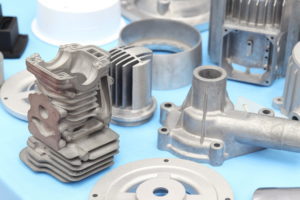Our Stahl Specialty Company Ideas
Our Stahl Specialty Company Ideas
Blog Article
Examine This Report about Stahl Specialty Company
Table of ContentsThe 9-Minute Rule for Stahl Specialty CompanySome Ideas on Stahl Specialty Company You Need To KnowStahl Specialty Company for BeginnersGet This Report on Stahl Specialty CompanyThe Greatest Guide To Stahl Specialty Company
The refined distinction hinges on the chemical material. Chemical Contrast of Cast Light weight aluminum Alloys Silicon advertises castability by minimizing the alloy's melting temperature and improving fluidness during spreading. It plays a crucial duty in permitting detailed molds to be filled precisely. Additionally, silicon adds to the alloy's stamina and use resistance, making it important in applications where longevity is critical, such as automobile parts and engine components.It additionally improves the machinability of the alloy, making it simpler to refine into finished products. In this way, iron adds to the overall workability of aluminum alloys. Copper boosts electrical conductivity, making it helpful in electric applications. It also improves deterioration resistance and contributes to the alloy's total strength.
Manganese contributes to the toughness of aluminum alloys and enhances workability. Magnesium is a lightweight component that gives toughness and effect resistance to aluminum alloys.
It allows the manufacturing of light-weight components with excellent mechanical residential properties. Zinc improves the castability of light weight aluminum alloys and assists manage the solidification procedure throughout spreading. It boosts the alloy's toughness and hardness. It is typically discovered in applications where elaborate shapes and fine information are needed, such as ornamental spreadings and specific automobile parts.
Getting The Stahl Specialty Company To Work
Because aluminum-silicon alloys have great casting residential or commercial properties, high gas homes, simple procedures, and outstanding deterioration resistance, aluminum-silicon alloys are most commonly utilized in the die-casting sector at home and abroad. At the very same time, aluminum-silicon alloys are additionally relatively early and commonly identified alloys developed and utilized in die-casting. After continual research and enhancement, the majority of the present global mainstream aluminum-silicon alloys have been finalized and are nothing greater than A356, A360, A380, ADC12, B390, and A413.
The primary thermal conductivity, tensile strength, yield toughness, and elongation differ. Amongst the above alloys, A356 has the greatest thermal conductivity, and A380 and ADC12 have the most affordable.

Not known Details About Stahl Specialty Company
In precision casting, 6063 is appropriate for applications where detailed geometries and high-grade surface finishes are extremely important. Examples include telecommunication units, where the alloy's superior formability enables smooth and aesthetically pleasing layouts while maintaining structural stability. Likewise, in the Lighting Solutions market, precision-cast 6063 components create sophisticated and efficient illumination components that call for intricate forms and great thermal efficiency.
(https://www.brownbook.net/business/53636075/stahl-specialty-company/)
It leads to a finer surface area coating and better rust resistance in A360. The A360 shows remarkable elongation, making it optimal for complicated and thin-walled elements. In precision casting applications, A360 is well-suited for markets such as Customer Electronic Devices, Telecommunication, and Power Tools. Casting Foundry. Its enhanced fluidness allows for detailed, high-precision parts like mobile phone cases and communication tool housings.

In accuracy spreading, aluminum 413 beams in the Consumer Electronics and Power Equipment sectors. This alloy's superior deterioration resistance makes it an exceptional option for outdoor applications, making certain lasting, long lasting products in the stated sectors.
The Only Guide to Stahl Specialty Company
The aluminum alloy you choose will significantly affect both the spreading process and the homes of the final product. Due to the fact that of this, you have to make your decision very carefully and take an enlightened strategy.
Figuring out the most suitable aluminum alloy for your application will certainly suggest evaluating a broad variety of attributes. The first classification addresses alloy qualities that affect the production process.
The alloy you choose for die spreading straight affects a number of elements of the casting process, like exactly how very easy the alloy is to collaborate with and if it is vulnerable to casting issues. Warm fracturing, additionally called solidification cracking, is a common die spreading problem for light weight aluminum alloys that can lead to read review inner or surface-level tears or splits.
The Stahl Specialty Company PDFs
Particular light weight aluminum alloys are more prone to hot cracking than others, and your choice must consider this. An additional typical issue located in the die spreading of light weight aluminum is pass away soldering, which is when the cast stays with the die walls and makes ejection challenging. It can harm both the cast and the die, so you should seek alloys with high anti-soldering homes.
Corrosion resistance, which is already a noteworthy attribute of light weight aluminum, can differ considerably from alloy to alloy and is an essential characteristic to consider depending on the environmental problems your item will certainly be exposed to. Use resistance is an additional property generally sought in aluminum products and can separate some alloys.
Report this page